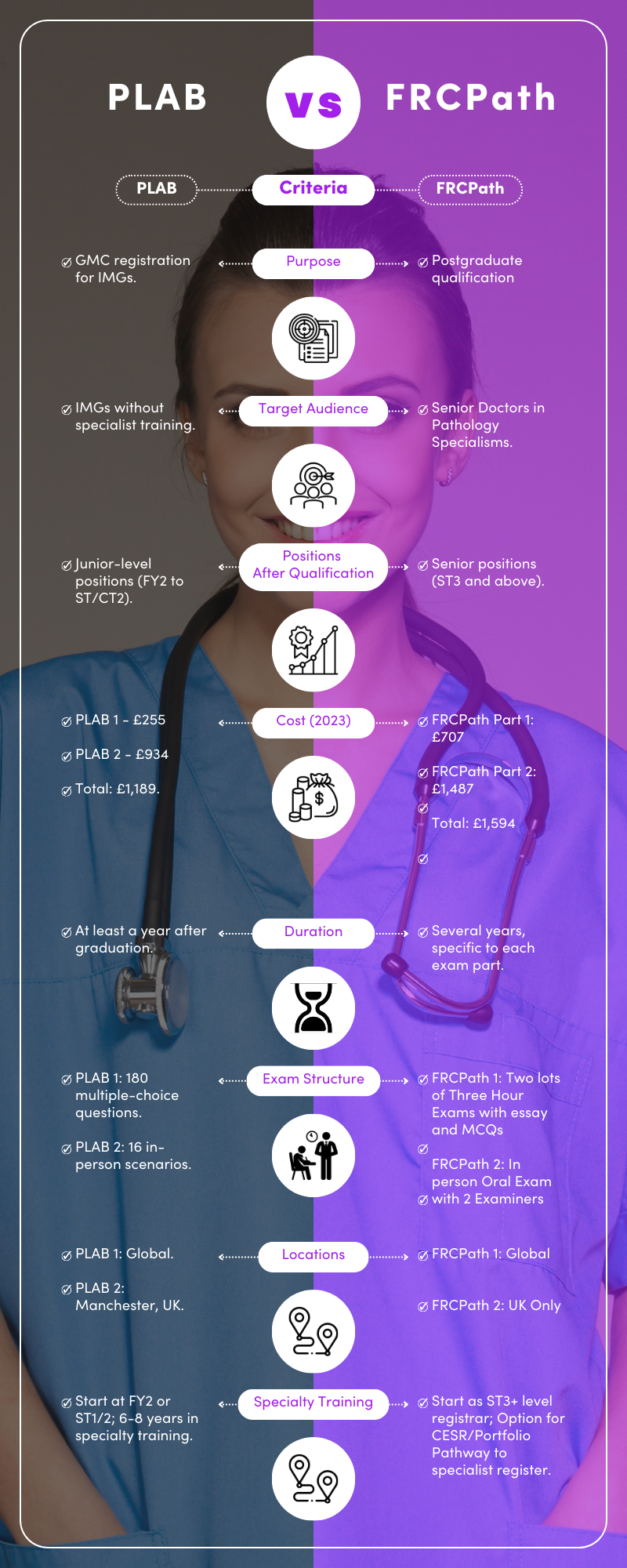
FRCPath For GMC Registration
16 Feb, 20238 Minutes
FRCPath is a qualification awarded by the Royal College of Pathologists. The award is offered in over twenty specialities, including haematology, forensic pathology, immunology, and genetics. With this qualification, the Royal College of Pathologists creates a set standard for all pathologists working in the UK, which promises quality assurance and safe practice.
FRCPath examinations are open to both people in the UK and overseas doctors. For IMGs, the FRCPath is a route towards GMC registration, as the General Medical Council approve it as a postgraduate qualification. So, if you want to work in the UK as a pathologist, then doing the FRCPath examinations makes sense.
FRCPath Examinations: Cost, Eligibility, and How to Apply
Part 1: £707
Part 2: £1,487
The cost of the examinations is the same across all specialities.
Eligibility differs depending on each speciality, but generally, you are expected to have at least one year of training in your chosen speciality before applying to part one. For part two, you are expected to have multiple years of speciality experience. To know the exact eligibility criteria, you’ll need to look specifically at your chosen speciality.
Applying is simple, and you can do so from anywhere in the world on the RCPath website, where you will need to fill in an application form. Just remember to read the regulations and guidelines before doing so!
Also, it’s important to note that there is another route to getting the FRCPath qualification besides taking the exams; however, this route is only for specialist pathologists with many years of experience. To achieve the award this way, you’ll need to have completed at least five years of pathology work and have published a minimum of thirty peer-reviewed publications. You’ll also need to have contributed to high-quality research in the field. Again, this is for pathologists already holding a senior role – if you’re a trainee pathologist wanting GMC registration, the path to getting there involves completing the FRCPath examinations.
An Overview of the FRCPath Examinations
The content of the FRCPath exams depends on the speciality, especially regarding the exam’s topics.
All FRCPath exams are split into two parts: part one and part two. Part one involves a written paper consisting of either multiple-choice or extended matching item questions. Since spring 2021, you can complete FRCPath part one exams from anywhere in the world by using the Test Reach online platform. You just need a good internet connection!
Part two of the FRCPath exams is different, consisting of various components and taking place over two days. With the exception of some specialities, you will need to travel to the UK to complete part two, as some involve an oral examination.
To gain your FRCPath qualification, you must pass both exam parts.
Preparing for FRCPath Exams
We recommend at least three to nine months of preparation for part one and at least one to two years of prep for part two. You only get four attempts per exam, so it’s essential to adequately prepare before sitting the exam.
To pass the FRCPath exams, do as many past papers as you can – you should be able to find them in your chosen speciality on the Royal College of Pathologists website. By practising in this way, you’ll grow to understand the structure of the exam better. Plus, you can time yourself to see how long you need on each question. So the more you practice, the better you’ll become.
It’s also important to vary your resources; use a mixture of books, courses, and videos to revise for the exams. You should also cover each topic evenly. Don’t forget to look through the exam syllabus so that you can really focus your studies on the subject matter of the exams.
Of course, training is a huge part of preparing for such an examination, as you will use your clinical knowledge and experience in many areas of the exam. That’s why eligibility is often based on how many years of training you have. The more years you have, the more likely you are to pass the exam. Take advantage of any mentoring that is available to you, too – a good mentor can help you prepare for the exam, increasing your chances of passing the first time.
What Happens if You Fail?
If you fail, you can sit with an educational or support advisor, who will give you limited feedback to help you understand where you went wrong. This is important, as understanding why you failed means you know how to adjust so that you pass the next time. Remember that you only get four attempts per examination.
Passed! What Next?
If you passed FRCPath part one and part two – congratulations! They are difficult exams and demonstrate that you have a lot of knowledge in your chosen pathology speciality.
You should receive a certificate in the post after passing part one. After passing part two, you will receive your certification at a New Fellows ceremony, which is an excellent way to celebrate your achievement.
If you want to work in the UK and use your FRCPath qualification for GMC registration, you’ll need to apply for GMC registration once you receive your passes. However, remember that the FRCPath postgraduate qualification is not all you will need – to become GMC registered, you will also need to pass the IELTS or OET, and go through an ID check in the UK.
Passing the FRCPath exams can also help you achieve CESR, which gets you on the NHS specialist register and allows you to work as a consultant in your chosen speciality.
How to decide between FRCPath and PLAB
If you're unsure which route is right for you then maybe it's worth also considering PLAB. Both will lead you to GMC Registration however they are quite different. Our article entitled Should I sit PLAB or FRCPath for GMC Registration explains everything you need to know and can be summarised in this handy infographic:

In Summary
FRCPath is a qualification offered in multiple pathology specialities. To pass, you’ll need to complete two parts of an exam. It’s the ideal route towards GMC registration for any IMG doctor that wants to work as a pathologist in the UK.
Of course, each FRCPath examination is different depending on the speciality. In the following articles, we will dive into those specialities – up next, we’ll discuss FRCPath Haematology, including eligibility, how to apply, and the exam structure.
If you are a pathologist hoping to secure FRCPath on your road to working in the NHS then get in touch and we’ll be happy to help with interview materials, template CVs and all the latest job opportunities.


